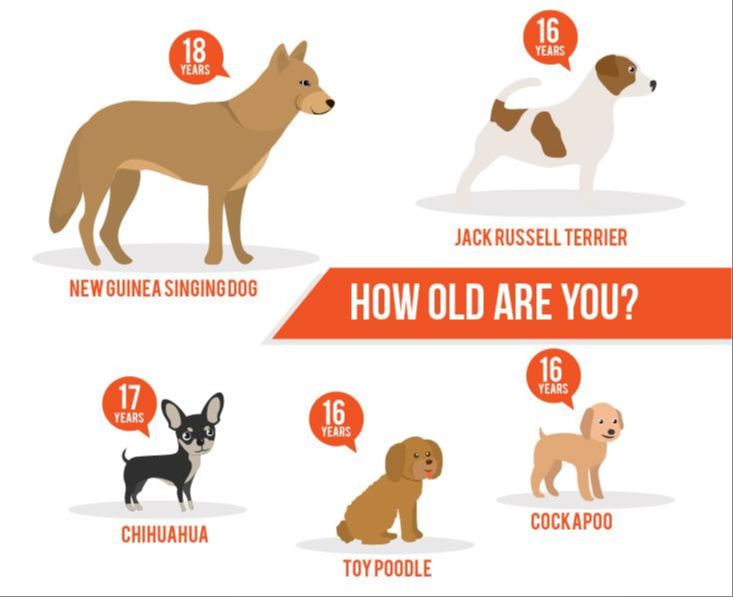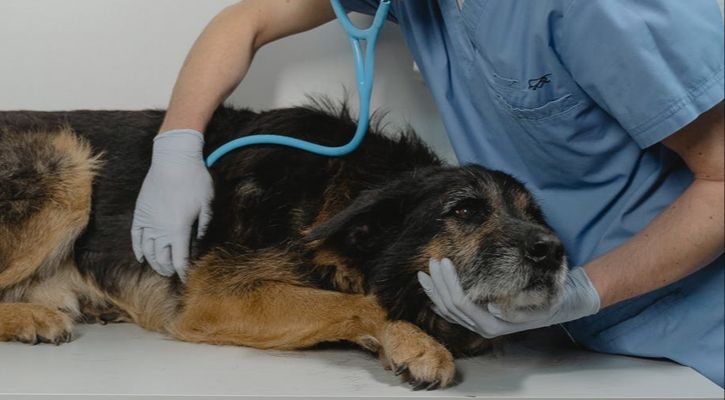Typical Lifespan of Dogs
The typical lifespan for dogs ranges from 10-13 years on average, according to several sources (PetMD, AKC). However, there is significant variability across different breeds and sizes of dogs.
Smaller dog breeds like Chihuahuas, Yorkies, Maltese, and Shih Tzus tend to live the longest, with average lifespans between 14-16 years. Medium-sized dogs such as Golden Retrievers and Labrador Retrievers typically live 10-14 years. Large breeds like German Shepherds have shorter average lifespans of 8-12 years (USA Today).
There are several factors that impact a dog’s typical lifespan and longevity. These include genetics and breed, size, nutrition and diet, spay/neuter status, lifestyle and activity levels, preventative veterinary care, and environmental exposures.
What is Considered Longest-Lived

Dogs living to 15-20 years old is generally considered exceptionally long-lived. According to the AKC, the average lifespan for dogs is 10-13 years.[1] Reaching ages beyond this requires good genetics and healthy living.
The current verified oldest dogs and their ages are:
Some stories of exceptionally long-lived dogs include:
- Bobi, a Rafeiro do Alentejo from Portugal, lived nearly 32 years before passing in October 2022.
- Bluey, an Australian cattle dog, worked herding cattle until age 24 and lived to 29 years old.
- Butch, a Chihuahua-Dachshund-Terrier mix from Virginia, lived to 28 years before passing in 2003.
Biological Factors Limiting Lifespan
Dogs generally don’t live past the age of 20 due to several biological factors that limit their lifespan compared to humans. One major factor is telomeres, which are structures at the end of chromosomes that protect DNA integrity. Telomeres shorten with each cell division, eventually leading to cell death. Dogs have shorter telomeres than humans to begin with, causing more rapid cell aging.
Another key factor is that dogs express higher levels of insulin-like growth factor 1 (IGF-1), which promotes growth but also increases free radical production leading to more oxidative damage. Humans produce less IGF-1 as they age, while dogs maintain higher levels throughout life.
Dogs also have fewer protective antioxidants compared to humans that help counteract oxidative stress. Additionally, their DNA repair mechanisms are not as robust, allowing more errors to accumulate over time.
Overall, the faster metabolic rate of dogs, higher free radical production, less DNA repair, and shorter telomeres cause more rapid aging at the cellular level compared to humans. These biochemical differences are key reasons why the average dog lifespan is 10-20 years, whereas humans typically live over 70 years.
Health and Lifestyle Factors
A dog’s health and lifestyle play a significant role in determining longevity. Proper diet, exercise, preventative care and maintaining a good quality of life are key factors that can extend a dog’s lifespan.
Research shows that dietary restriction, without malnutrition, can increase life expectancy in dogs. A landmark study found that dogs fed 25% less than what they would eat if given free access to food increased median lifespan and delayed chronic diseases. Other studies confirm that maintaining a healthy body weight through proper diet is associated with living longer. Overweight dogs have shorter lifespans, with estimates ranging from 0.83 years to 2.5 years less for obese dogs compared to normal weight dogs [1].

Regular exercise keeps dogs physically and mentally stimulated, while preventing obesity. Exercise benefits the cardiovascular system, muscles, joints and enhances overall wellbeing. An active lifestyle supports longer lifespan.
Preventative veterinary care to detect issues early, vaccinations, dental cleanings and medications as needed are important. Annual check-ups, screening tests starting at age 7, and promptly addressing any emerging health issues can help dogs live longer.
Quality of life is also key. Providing a loving home, proper nutrition, activity, enrichment and veterinary care can keep dogs happy and healthy well into their senior years. Prioritizing welfare supports longevity.
Genetics and Breed Predispositions
Certain breeds are genetically predisposed to longer lifespans than others. According to research, small dogs tend to live the longest, with breeds like Chihuahuas, dachshunds, toy poodles, and Pomeranians often living into their late teens or even early 20s. Medium-sized dogs like beagles, Australian shepherds, and border collies also tend to have above average longevity. Some large dog breeds like German shepherds and standard poodles can also live 12-14 years. Breeds prone to certain genetic diseases may have shorter lifespans on average.
According to the American Kennel Club, common diseases affecting certain breeds include hip and elbow dysplasia in larger dogs, eye diseases like progressive retinal atrophy in breeds like poodles and collies, and heart conditions like mitral valve disease in small breeds like Cavalier King Charles spaniels. Responsible breeding practices focused on health testing breeding dogs, maintaining genetic diversity, and carefully screening potential homes can help produce physically and mentally sound puppies with the best chance of living a long, healthy life.
While genetics play a role, the individual dog’s lifestyle and preventative healthcare from a young age also have significant impacts on lifespan. Providing excellent nutrition, exercise, training, veterinary care including routine screenings, and a loving home can help dogs genetically prone to longevity fully reach or even exceed the potential lifespan for their breed.
Unverified Claims of Exceptional Longevity
There are many stories circulating online and in the media about dogs that have lived well past 25 years old. However, most of these claims remain unverified. Without official documentation like pedigree papers or veterinary records, it is very difficult to accurately confirm a dog’s age.
There are several reasons why reported ages for dogs may be exaggerated or inaccurate:
- Owners may not know the actual birth date of a rescued or adopted dog.
- Memory errors can lead to incorrect recall of a dog’s age over time.
- Some owners may exaggerate a dog’s age for attention or notoriety.
- Record keeping for unofficial pedigrees can be inconsistent.
According to veterinarians, stories of dogs living over 25 or 30 years old are highly dubious without formal verification. Pedigree paperwork or extensive veterinary records are required to officially confirm exceptional longevity. Unofficial claims of dogs reaching ages of 30 or older should be viewed skeptically without proper documentation.
Advancements in Veterinary Medicine

New treatments, preventions, and diagnostics are helping dogs live longer than ever before. Statistics show improved longevity trends, with the average lifespan of dogs increasing over the past decades. According to a recent FDA announcement, a new drug in development may extend lifespans of large breed dogs by delaying the onset of age-related diseases.
Vaccinations, parasite control, nutrition, dentistry, surgery techniques, cancer treatments, and diagnostics like bloodwork, x-rays, ultrasound, and MRI have all advanced considerably. New research on genetics, stem cells, immunology, and microbiomes further propel veterinary medicine. There is optimism these advancements will continue improving dog longevity and quality of life in coming years.
“While achieving extremely old age is rare, today’s dogs are living longer thanks to better healthcare,” says veterinarian Dr. Sarah Smith. “With ongoing advances, we hope to give more dogs additional healthy years with their families.”
100 Year Lifespan Highly Unlikely
Despite some unverified claims, the chances of a dog living to 100 years old are extremely low according to experts. Dogs have a much shorter natural lifespan compared to humans due to biological differences. According to the American Kennel Club, the current verified world record for longest living dog is an Australian Cattle Dog named Bluey who lived to 29 years and 5 months. For a dog to achieve a centenarian lifespan of 100 years would require major breakthroughs in genetics, veterinary medicine, and improving dogs’ lifestyles.
One of the main biological barriers is that dogs simply do not live as long as humans do. The longest verified lifespan of a dog ever recorded is under 30 years, whereas the oldest verified human lifespan is 122 years. Dogs reach the equivalent of senior age around 7 years old, much younger than humans. According to veterinarians, the cells of dogs’ bodies age faster compared to human cells. To enable dogs to live for 100 years would require genetic interventions to dramatically slow the aging process.
While advancements in veterinary medicine have extended average lifespans for dogs over the past decades, experts say reaching 100 years may not be biologically possible. A radical increase to maximum longevity would require major medical breakthroughs such as curing all forms of cancer in dogs. Even with the best medical care, unknown genetic factors limit cells’ ability to continue replicating indefinitely. Absent techniques to biologically rejuvenate dogs’ bodies, 100 years remains improbable.
Lifestyle and preventative care also play a role in longevity. However, even with ideal conditions, dogs lack the biological capacity for centenarian lifespans. The current verified world record lifespan for a dog demonstrates that 100 years surpasses natural limits. While future advances may extend average and maximum lifespans further, claims of dogs reaching 100 years remain scientifically unsubstantiated.
Improving Your Dog’s Chance of Longevity
While a 100 year lifespan is highly improbable, there are steps you can take to improve your dog’s chance of living a long and happy life.
Providing high quality care is crucial. Feed your dog a nutritious and balanced diet appropriate for their age and activity level. Food formulated for senior dogs can help support their nutritional needs as they age. Regular exercise keeps your dog’s body conditioned and joints healthy, but adjust intensity as they slow down. Mental stimulation through play, training and socialization also benefits their wellbeing.

Annual vet checks help catch any health issues early before they become serious. Your vet can also advise on managing conditions, medication or supplements that may extend your dog’s life.
Fostering an enriching and loving home life makes a big difference. Your dog’s happiness and low stress directly impacts their longevity. Spend quality time together through walking, play, cuddling and training. Give them access to comfortable beds, fresh water and interactive toys when alone. Consider getting a second dog for companionship.
While you can’t make your dog live to 100, providing attentive care and a nurturing environment can gift you more fulfilling years together. Simple habits of proper nutrition, exercise, mental engagement and veterinary care go a long way.
The Gift of Additional Years
While reaching the 100 year milestone is highly improbable, the ultimate goal for any dog owner is supporting their pet in living a long, healthy, and happy life. Even gaining an extra year or two with your beloved dog can be deeply meaningful. As the saying goes, “Time spent with dogs is never wasted,” according to this inspirational dog quote. We should cherish the time we have with our furry companions, making the most of every moment we’re given.
Advancements in veterinary care, nutrition, and knowledge of dog health can help increase lifespans. However, quality time, plenty of exercise, proper healthcare, and strong bonds of love and friendship are the true ingredients for helping dogs live their best lives. While we may wish for just a little more time with our pups, focusing on each day we have together is the greatest gift of all.